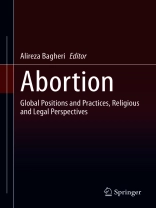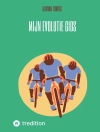Rather than providing a global solution to the problem of abortion —to abort or not to abort—this volume sheds light on different but equally critical dimensions of abortion in global debate and practice. The aim is to elaborate on different value systems and policies in order to empower individuals to make well-informed decisions about abortion guided by moral reflection. The twenty one chapters of this volume are written by distinguished scholars in each of the religious and non-religious schools of thought, offering an exhaustive survey of the differing religious and legal views on abortion within the international community. The contributors present authoritative discussions in favor of or against abortion based on their perspectives and practices. As a result, the content of this book provides a foundational platform for better understanding, meaningful dialogue, and tolerance on a social issue which has divided individuals, philosophers, theologians, policy makers, and legislators within and across societies for centuries.
Inhaltsverzeichnis
Foreword.- Preface.- Chapter 1. A Brief Introduction to Medical Practice and Public Policy in Abortion.- Chapter 2. Conservative Judaism on Abortion and Related Issues.- Chapter 3. Abortion from the Perspective of Orthodox Judaism.- Chapter 4. Abortion in Reform Judaism.- Chapter 5. Fearfully and Wonderfully Made: Catholic Church’s Position on Abortion.- Chapter 6. Church of England (Anglican) Perspectives on Abortion.- Chapter 7. Abortion from the Perspective of the Russian and Greek Orthodox.- Chapter 8. The Moral Evaluation of Abortion within the Wesleyan-Methodist Movement.- Chapter 9. Abortion in the Reformed Christian Tradition.- Chapter 10. Abortion in Hanafī Law.- Chapter 11. Maliki Perspectives on Abortion.- Chapter 12. Abortion: Shafei’i Perspective.- Chapter 13. Abortion in the Hanbali School of Jurisprudence: A Systematic Ethical Approach.- Chapter 14. Abortion: Shi’a Perspectives.- Chapter 15. Buddhism and Abortion.- Chapter 16. Abortion: Shinto Perspective.- Chapter17. The Ambivalence and Complexities in Hinduism in Portrayal of Abortion and Fertility.- Chapter 18. Confucianism and Abortion.- Chapter 19. A Survey of the United States Supreme Court’s Abortion Jurisprudence.- Chapter 20. The Role of Abortion in China’s Birth Control Program: A Socio-ethical Inquiry.- Chapter 21. Feminist Accounts of Abortion.- Index.
Über den Autor
Alireza Bagheri-chimeh, MD, Ph D, is assistant professor of medicine and medical ethics, in School of Medicine, Tehran University of Medical Sciences (Iran) and a research affiliate in the Centre for Health Care Ethics, Lakehead University (Canada). He is an Elected Fellow of The Hastings Center (USA).
Dr. Bagheri served as a member of the UNESCO International Bioethics Committee (2010-2018) and a member of the Board of Directors of the International Association of Bioethics (2009-2014). He serves as the book series editor; Intercultural Dialogue in Bioethics by the Imperial College Press. In 2010, Dr. Bagheri received the Rhazes Medical Research Award for his work on medical futility and in 2018, he received the Bioethics Leadership Award in recognition of his contribution to the discipline of bioethics scholarship at the international level.
Dr. Bagheri was a clinical ethics fellow at the Joint Center for Bioethics, University of Toronto, Canada (2006-7); Erasmus Mundus visiting professor in Leuven University, Belgium (2007–8); Edmund Pellegrino Fellow (2007); Visiting Scholar in the Center for Clinical Bioethics in Georgetown University, USA (2007–09). His published books include; Medical Futility (2013); Biomedical Ethics in Iran (2014); Global Bioethics (2015); Islamic Bioethics (2017).
As a palliative care physician and a clinical ethicist, he advocates close attention to both; clinical realities as well as socio-cultural context in healthcare decision making.












